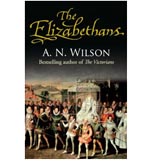Book Review: The Elizabethans
Roy Strong applauds a scholarly, far-reaching and compulsively readable re-examination of the reign of Elizabeth I


Exquisite houses, the beauty of Nature, and how to get the most from your life, straight to your inbox.
You are now subscribed
Your newsletter sign-up was successful
To order any of the books reviewed or any other book in print, at
discount prices* and with free p&p to UK addresses, telephone the Country Life Bookshop on Bookshop 0843 060 0023. Or send a cheque/postal order to the Country Life Bookshop, PO Box 60, Helston TR13 0TP * See individual reviews for CL Bookshop price
History The Elizabethans A. N. Wilson (Hutchinson, £25, *£22)
It is, of course, an apposite moment to produce a bird's-eye view of the nation's greatest age as it teeters towards becoming again, exactly what it was in 1603, the kingdom of England. A. N. Wilson is a brilliant writer and this book is a compulsive read. He has the ability not only to view the tide of history from a high vantage point, but equally to swoop low to catch some telling and quite unexpected but revealing detail. My only reservation is the disappointing choice of illustrations. Why, the reader may well ask, is this an apposite moment?
It is because we are at the close of the reign of a second Elizabeth, and lurking behind this scintillating panorama is an unsaid subplot that, as far as I understood it, argues that what came with Elizabeth I finally went with her namesake. I can't take such a gloomy perspective as to where we are now, but as far as Mr Wilson is concerned, the England Gloriana created over four decades remained, give or take a bit, still in place until about 1950. I wish that he had elaborated more on that beyond pointing out that our Church has been reduced to a sect and that the great families that guided the country's destinies finally lost their power at that period.
This book is a commanding deployment of all the latest research on the reign, laced with the author's pungent and often rightly acerbic comments. The parallel between us and them, our world and theirs, should give every reader reason to meditate on where some of it will lead. I think of Mr Wilson's casting of the Jesuit stormtroopers for Catholicism forming cells to destroy the Elizabethan state as the Tudor version of the Islamic terrorists in our midst today.
There is a great emphasis on what was important to the Elizabethans, most of which we have thrown out or held up to Bloomsbury derision: ritual, order, ceremony and obedience. He rightly castigates modern historians of the period for downplaying our defeat of the Spanish Armada, a defeat that, in fact, ensured the survival of liberal thought in Western Europe. He tries to penetrate the thoughts of the silent majority in opposition to historians who reach their conclusions by concentrating on the outpourings of the literate opponents of the regime, both on the extreme left and right. Bravely, the queen and her mafia tried to create a middle way, which most went along with. In the long run, this was to serve England well until the extremities of multiculturalism in our time set out to destroy it.
Exquisite houses, the beauty of Nature, and how to get the most from your life, straight to your inbox.
There was a nasty side to the Elizabethan age, and that is not glossed over. There was poverty, disease and slavery. Gaelic civilisation was expunged, along with that of the native Americans. All of that and much more has to be offset by an explosion of energy, enthusiasm, creativity and originality unequalled anywhere else at the time.I fell in love with the reign of Elizabeth I 60 years ago. This book rekindles my pride and passion for what, without doubt, was our greatest age and greatest ruler.
* Subscribe to Country Life and up to £50
Country Life is unlike any other magazine: the only glossy weekly on the newsstand and the only magazine that has been guest-edited by His Majesty The King not once, but twice. It is a celebration of modern rural life and all its diverse joys and pleasures — that was first published in Queen Victoria's Diamond Jubilee year. Our eclectic mixture of witty and informative content — from the most up-to-date property news and commentary and a coveted glimpse inside some of the UK's best houses and gardens, to gardening, the arts and interior design, written by experts in their field — still cannot be found in print or online, anywhere else.
